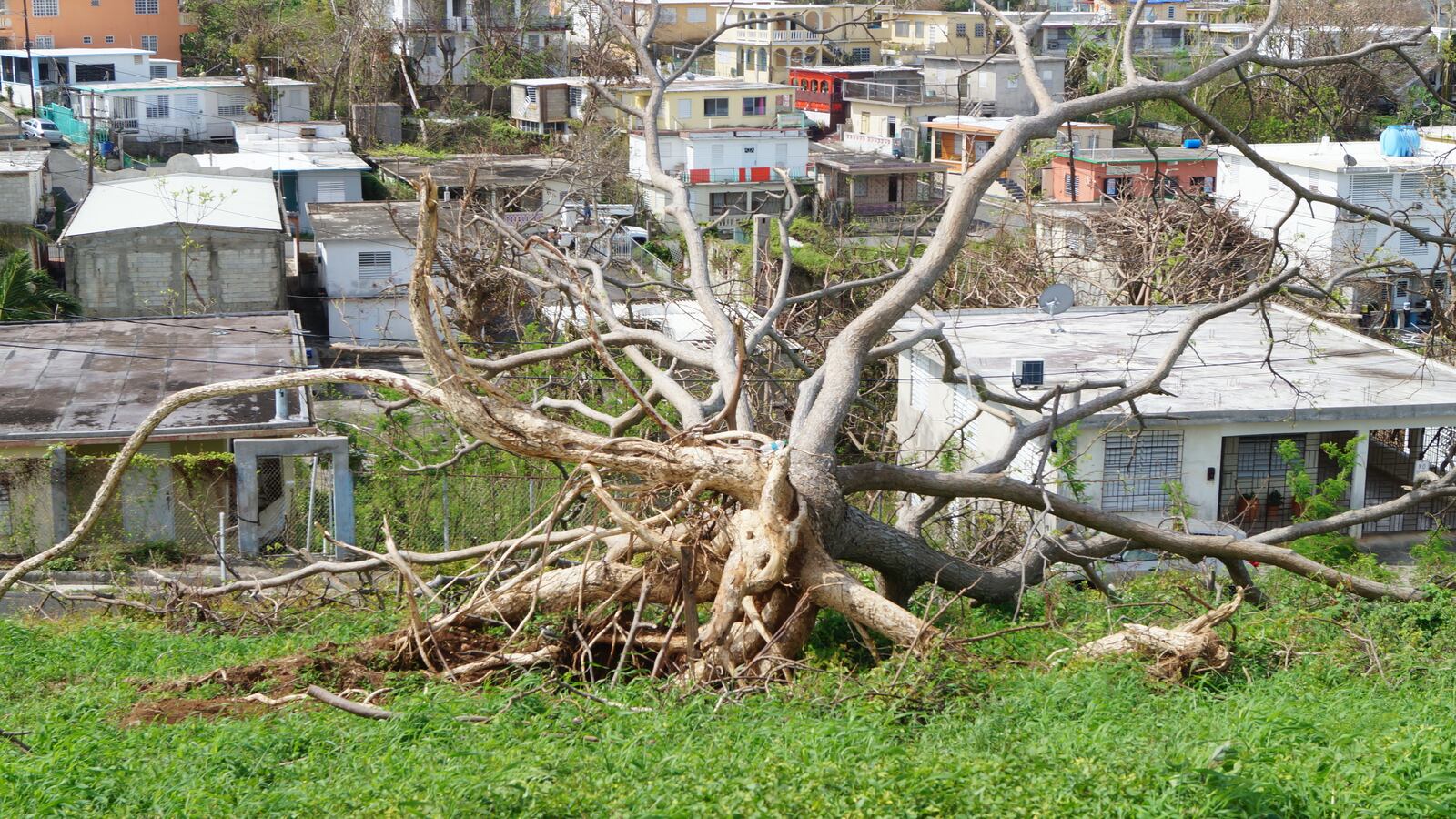VIEQUES, Puerto Rico—Joe and Maria Bernard cook in the dark over a gas stove outside their small hotel, the Tropical Guest House. “The days feel shorter,” says Maria, “we just have 12 hours of daylight to get everything done.”
When it gets dark, the entire island of Vieques is dark.
This is life on the world-renowned tourist island. And it’s going to be life for at least the next six to eight months, if not longer, before electricity is restored here.
“We’re in denial,” says Maria, “we’re going to give it another two weeks maybe a month, then maybe we’ll have to go back to the States.”
In 2005, the couple traded in the bustle of New York and jobs in the television industry for a more rewarding future in Puerto Rico, which offered triple-tax exemption for resettling here. With their savings, they got a loan to buy their turnkey hotel.
“It was our baby,” says Joe.

“It was number two on TripAdvisor,” Maria chimes in.
The neat, white, 15-room hotel withstood Maria’s merciless fury. Now it stands out as a daily reminder of Plan B, as Joe calls it.
“We have big overhead, and a mortgage,” says Joe while clearing the fallen trees in the back. “I’ll sell everything, the beds, the tables, the chairs, everything, then seal it shut.”
Then Joe adds, as if reading from a to-do list: “Go back to the U.S., our families, make some money in television, wait a while, and come back.”
But the “come back” is part of the denial. Puerto Rico has seen a stream of people leaving for decades to the point that more Puerto Ricans live in the mainland U.S. than the island. The blow Hurricane Maria dealt the island has supercharged the exodus.
“I’m leaving to get a better life,” says 19-year-old Isaac Torres on the ferry back from Vieques to the mainland. “In two weeks, two hurricanes. You’re without a job.”
He and his girlfriend, Gabriela Velazquez, worked at the Humane Society on Vieques where only but a few animals survived.

“We all want an opportunity to shine,” says Torres who wants to study criminal justice and become a cop.
“This is the golden opportunity to start something new,” not even giving the mainland a second thought. “We’ve got our flights booked for this Monday to the U.S.”
Maria has effectively brought Vieques to a standstill. There is no cellphone service or internet. No electricity means no refrigeration, no ice, no air conditioning, no stocking up food—breaking every link in the chain of tourism-related services.
The radio station even advised tourists not to come.
For the islanders who depend on every step of the ladder of the tourism industry, it is shattering. The only five-star hotel, the W, was so badly damaged the owner has shut it down indefinitely and laid off its entire staff.
The same for other establishments like the Blue Horizon hotel where Jose Miguel lost his job.
“I’m going to have to leave,” says Miguel on the ferry. Next to him, Jose Alexis, a construction worker chimes in, “There’s no electricity, I have no work. I’ll have to go.”
Only 8 percent of Puerto Rico’s electricity has been restored as of Sunday, and the old grid is irreparable in many places, aside some quick fixes.

“We had a plan to modernize our grid before Maria, which involved private companies, we called it PREPA 2.0. We were going to present at a Caribbean summit,” Ricardo Ramos, the head of Puerto Rico’s electric power utility, PREPA, explains. “After Maria, we reached out, and those companies demanded $25 million down payment upfront. We didn’t have the money.”
Without a massive infusion of federal aid, Puerto Rico will only be able to temporarily fix the cracks but not overhaul the whole system. And with no reserves—the island filed for bankruptcy last May, unable to meet its obligations on a $77 billion external debt—it’s like borrowing from Peter to pay Paul. It’s status as a commonwealth deprives it of the customary waivers and block grants other hard hit areas like Texas and Florida received after their hurricanes.
“We’re part of the biggest country club in the world!” shouted Leopoldo Rosso, “but the relationship has changed, like a couple. The rich husband discards his aging wife. Now Puerto Rico has become a problem for the U.S.”
Rosso lost his job as a tourist guide because of Maria and now his son.
“The two most important things in my life, my job as a tourist guide and my son” are lost, he said, referring to 18-year-old Matthieu, who said he would join his mother’s family in France to study there. “He doesn’t see a future here.”

Not everyone was thinking of leaving until Maria hit.
“I originally wanted to stay,” says Geraldo Medina, a graduate in economics at the University of Puerto Rico. “I wanted to stay for the family, but now it will take years to straighten the country out and there’s no opportunity.”
Puerto Rico will always be home for Medina who sees the underlying unease between the U.S. mainland and the island, “Maria has been an education for a lot of Americans.”
Joe and Maria pull out a map of Vieques and point to one of the advertisements for their hotel.
“I guess we can stop that now. It’ll save us $ 600, maybe we can buy a small generator,” Joe tells Maria. “Why advertise? No one is going to come here.”
Still not everyone is jumping ship or ferry. Marco Vega was headed back to Vieques, with a generator for his restaurant, El Guayacan.
“I’m going to install it and get to work tomorrow. Open up the restaurant.”
Though many are leaving, more are not giving up.





